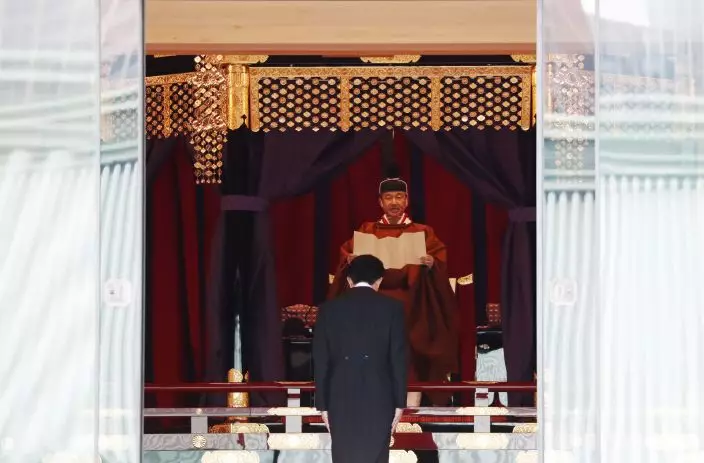The Latest on Japanese Emperor Naruhito's enthronement ceremony (all times local):
1:20 p.m.
Japan's Emperor Naruhito has proclaimed his ascension to the Chrysanthemum Throne at a palace ceremony.

Japan's Emperor Naruhito speaks as Prime Minister Shinzo Abe bows during a ceremony to proclaim his enthronement to the world, called Sokuirei-Seiden-no-gi, at the Imperial Palace in Tokyo, Japan, Tuesday, Oct. 22, 2019. (Issei KatoPool Photo via AP)
Tuesday's enthronement ceremony is the high point of succession rituals and confirms his succession in May after his father Akihito abdicated. Naruhito is the 126th emperor in the world's oldest hereditary monarchy that historians say dates back 1,500 years.
The ceremony serves to showcase the monarchy to win public support and to preserve Japan's cultural heritage.
It's also an occasion for diplomacy. Some 2,000 guests, including foreign dignitaries, were invited from in and outside the country.
Naruhito and his wife Masako, a Harvard-educated former diplomat, visited three sacred shrines at the palace to report to the Shinto gods earlier Tuesday ahead of the key ceremony.
12:30 p.m.
Japan's government has pardoned about 550,000 people convicted of petty crimes to mark Emperor Naruhito's enthronement ceremony.
The measure, approved by Prime Minister Shinzo Abe's Cabinet last week, was published Tuesday in the special edition of the daily official gazette.
Emperor Naruhito is to proclaim his May 1 succession to the Chrysanthemum Throne in a palace ceremony later Tuesday.
The pardons cover those who committed petty crimes such as traffic violations and election fraud.
The pre-war custom of clemency by the emperor has triggered criticism as being undemocratic and politically motivated. At the time of former emperor Akihito's enthronement, 2.5 million people were given amnesty.
9 a.m.
Japan's Emperor Naruhito is visiting three Shinto shrines at the Imperial Palace before proclaiming himself Japan's emperor in an enthronement ceremony.
The 59-year-old emperor put on a white robe and prayed at "Kashikodokoro" and two other shrines. The visits Tuesday morning are to report to gods ahead of the ceremony, to be attended by 2,000 guests from in and outside Japan.
The enthronement ceremony the high point of succession rituals that began in May when Naruhito succeeded the Chrysanthemum Throne as Japan's 126th emperor after the abdication of his father, Akihito.
The proclamation event is largely meant to allow the government to showcase the monarchy to win public support and to preserve Japan's cultural heritage.
Naruhito and his wife Masako, a Harvard-educated former diplomat, will host a banquet later Tuesday.


